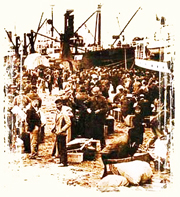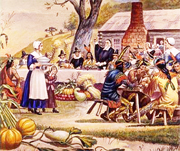"The present in New York is so powerful that the past is lost."
Essayist John Jay Chapman said that, sometime before his death in the 1940s. To say that New York has changed since then is a major understatement.
But to say that Mr Chapman was wrong, even for the fast-changing Metropolis New York was only turning out to be in the 1930s, would be an even larger understatement.

The present in New York is indeed powerful. And yes, it absorbs both the past and the future. But the fact that it is forgotten by some doesn't mean it's lost. New York is every inch the Dutch colony that was founded in 1623 by 100 immigrants.
Its first 400 inhabitants spoke up to 18 languages, even though they all came from Amsterdam. Its past is different to that of any other city in the United States: New York was never Puritan. It was raised on commerce, not on agriculture. It had more faith in pirates than it did in preachers. It barely had anything to do with slavery (slave money is a different matter). It never had much respect for the Union. It didn't believe much in independence either. Mainly because it never had much respect for authorities. This isn't a city of drones. It's a city of freethinkers, charlatans, misfits and adrenaline junkies. That was, is and will be New York.

So here is a small history of New York. It calls for a small warning, though. It doesn't attempt to provide with an abridged recapitulation of events as if something out of an Encyclopedia.
Since you want to travel to New York, or maybe are even there right now, this has a more tangible approach. Instead of following the historic beats of the city, you will be following the different faces the city has had through the years until it has become the one we know today.
For example, let's take another quote from the very New York-ish John Jay Chapman. Speaking to the graduating class of Hobart College in 1900, he advised them to, "Do what you will, but speak out always. Be shunned, be hated, be ridiculed, be scared, be in doubt, but don't be gagged. Try to raise a voice that will be heard from here to Albany".
Historians and researchers might be able to indicate what exactly the Hobart College graduates from 1900 did with their lives. This history will not. This history will instead explain that if they followed Chapman's words and never shut up, they would have become irreparable New Yorkers.